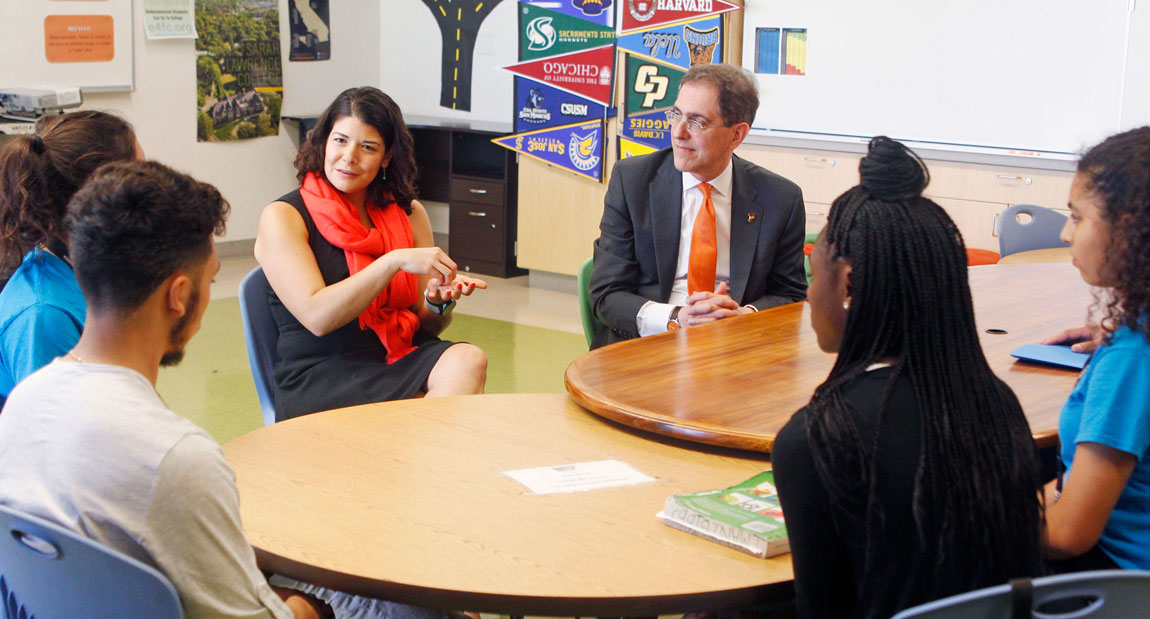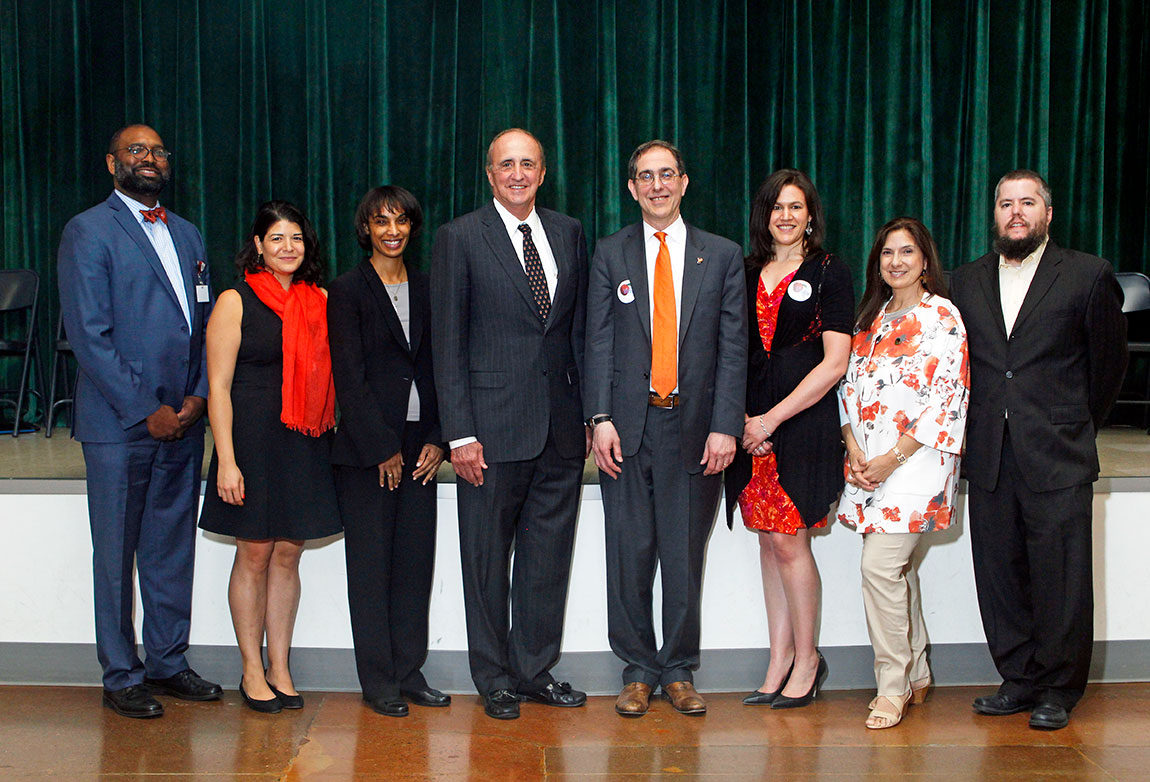Stressing that college is a "difference maker" in people's lives, Princeton University President Christopher L. Eisgruber focused on ways to improve college access and success for low-income and first-generation students during a visit to the Bay Area on Wednesday, May 3.
Eisgruber was joined by Princeton administrators, including Cecilia Rouse, dean of the Woodrow Wilson School of Public and International Affairs, and Khristina Gonzalez, associate dean of the college for programs of access and inclusion, for a tour of the Making Waves Academy charter school in Richmond, California. Eisgruber also led a roundtable discussion in San Francisco that included K-12 education officials, university faculty, researchers, nonprofit leaders and Princeton alumni.

Eisgruber told roundtable participants that he hopes to build on the progress Princeton has made in attracting and supporting low-income and first-generation students while also contributing to a broader national conversation about how educators can better serve these students.
"For me, getting greater socioeconomic diversity in higher education generally and at Princeton is one of the most important things we can do right now to make a difference in the world," he said. "I'm convinced that getting more college degrees for kids from low-income backgrounds is something of extraordinary importance to our country."
Visiting the 'Wave Makers'
The day began at Making Waves, a public charter school that serves about 780 students in grades five through 12 in Richmond, a city of about 100,000 located 16 miles northeast of San Francisco. The school, which Princeton alumnus John Scully founded, serves mostly poor Latino students and focuses on providing the support needed to help them reach college and earn a degree with minimal student-loan debt.
Eisgruber, Rouse and Gonzalez toured classrooms at the school, observing a chemistry class, talking with students about their study of the book "Into the Wild" in a literature class and watching precalculus students at work.
At an assembly for high school students, Making Waves Chief Executive Alton Nelson Jr. welcomed the Princeton group and said the school was honored by the visit.
"Making Waves Academy is a very special community comprised of faculty, staff and leadership who care about our students,” Nelson said. “Most important are the students and families who have chosen Making Waves Academy. They have shared with me that this is a place that will help them achieve their hopes and dreams for their futures. It is in that spirit we welcome our special visitors today."
Eisgruber told the students — known at the school as "Wave Makers" — his own story of coming to Princeton from Corvallis, Oregon, as an undergraduate, and the challenges and rewards that experience brought him. He told the students that taking on the challenge of college would pay off for them as well.
"Going to college and getting that degree is a real difference maker," he said. "It's a difference maker for your life, in the doors it will open for you. It's a difference maker in your opportunities to help your families and your communities."
Rouse told the students about the self-doubt she experienced during her own education and asked who in the room had at times felt they were the only one in their class who "didn't get it" — didn't understand an assignment or a concept. Nearly everyone — including Eisgruber — raised a hand.
"What I learned along the way was I had to keep working," Rouse said. "Almost everyone feels the same way sometimes."
Her advice: Don't be afraid to ask questions, reach out for support, and take care of yourself.
Gonzalez told the students they are needed in higher education.
"We are waiting for you," she said. "We are waiting for your voice. We are waiting for you to do the wonderful work in math, in politics, in economics, in literature and in the arts that you are going to contribute to this world."

Seeking Answers
The afternoon roundtable at San Francisco's Fairmont Hotel focused on identifying promising strategies to attract, enroll, and graduate low-income and first-generation students and addressing the hurdles that stand in the way of their success.
Along with the Princeton administrators, participants from higher education included John Etchemendy, provost emeritus at Stanford University; Ralph Hexter, interim chancellor at the University of California-Davis; Jesse Rothstein, a professor of public policy and labor economics at the University of California-Berkeley, and former Princeton faculty member; and Claude Steele, a professor of psychology at Berkeley.
Eisgruber noted successes at Princeton, including raising the percentage of students eligible for federal Pell grants — a proxy for financial need — to 21 percent for the Class of 2020, up from 7 percent a little more than a decade ago. The University is also participating in the American Talent Initiative, which seeks to increase the enrollment of low-income students at 270 colleges and universities across the country, and Eisgruber is serving on its steering committee.
"One of the things that has been impressive to me as I have become more involved in this area and we have made progress on it is that there are strategies that can genuinely make a difference," Eisgruber said. "The talent is there, and with the right kind of information and persistence on our part as institutions, I really feel that we can move the needle even in a time when getting additional government funding for these kinds of things seems close to impossible in most venues."
Rouse added that broader economic trends make the need to help low-income students succeed even more urgent.
"As a country, education is one of the foundations for economic growth, and right now we're facing the twin challenges of increasing income inequality and anemic economic growth," she said.
Bernard McCune, deputy chief of the Office of Post Secondary Readiness at the Oakland Unified School District, said his district works with partners to use a birth-to-career strategy that helps parents and children be prepared for college.
"We can't start that engagement and rigor at the high school level and probably not even the middle school level," McCune said. "The things I have seen that have worked get students and parents to understand what the expectations and levers for success are."
Stephen Koffman, executive director of the Office of College and Career Readiness at the San Francisco Unified School District, said his district identifies students as early as sixth grade who might be at risk of not graduating from high school and works to support them. The district also downplays high-stakes Advanced Placement courses that can yield college credit through an exam in favor of early college courses offered through the Community College of San Francisco.
Steele, whose book "Whistling Vivaldi: How Stereotypes Affect Us and What We Can Do" Eisgruber selected for the "Pre-read" for incoming Princeton students in 2015, said large public universities must play a big role in addressing the needs of such students. An institution such as Princeton can help by providing leadership and demonstrating the value of having socioeconomic diversity on its campus, he said.
Eisgruber said Princeton began expanding its efforts to attract and retain more low-income, first-generation students when administrators realized that the University's generous financial aid alone wasn't enough.
The first step was targeted outreach to low-income, first-generation prospective students, seeking to answer questions such as whether the students would feel comfortable on campus and could afford to attend. Second, administrators began looking at applications differently, recognizing that some students must work during high school, limiting their opportunities for outside activities. Third, the University helps the students visit campus after they are admitted, hoping to show them that they will feel at home there.
Finally, the University has stepped up efforts to support such students on campus, including the Freshman Scholars Institute, an eight-week summer program for incoming first-year students, and the Scholars Institute Fellows Program, which offers support throughout students' Princeton careers. Gonzalez leads both programs.
Etchemendy praised such efforts but noted their costs can be high. Bob Peck, a Princeton alumnus and managing director of FPR Partners, asked whether a corps of volunteer mentors might be able to offer support to such students.
Lauren Asher, president of the Institute for College Access and Success, noted two other obstacles to the success of these students. First, she said, financial aid award letters are often presented in a confusing, unclear way, making it difficult for students and families to understand the true cost of an education. And at the institutions that serve most low-income, first-generation students — less-selective universities and community colleges — the aid offered simply isn't enough, she said.
"I'm the last person to say financial aid is the solution to every problem, but for the vast majority of students who are facing economic challenges, it is insufficient," she said.
Those institutions also lack the counseling and support available at universities such as Princeton, Rothstein said.
"If we're going to make any progress on this, we've got to get more resources to the less selective public universities and community colleges, even though it seems impossible now," he said.
Steele said another problem is the reliance on the SAT test to identify promising students, noting the poor power of the test to predict success in college and the advantages wealthier students have in preparing for the test.
"Are there criteria that would be better at bringing forth talent to us?" Steele asked.
Concluding the conversation, Eisgruber said he hopes that progress can continue even in the face of enormous challenges, such as the absence of greater public funding for universities.
"The challenges are huge, but the differences we can make are really considerable," he said.

